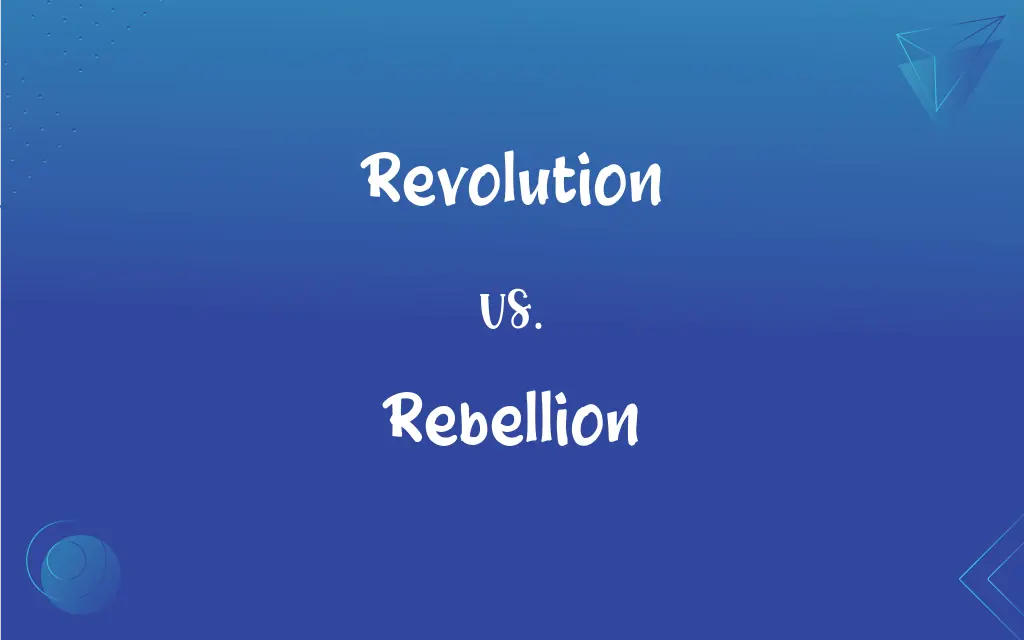Revolution vs. Rebellion: What's the Difference?
Edited by Aimie Carlson || By Janet White || Updated on October 2, 2023
Revolution is a fundamental and often drastic change in power or organizational structures, while Rebellion is an act of violent or open resistance to an established government or ruler.

Key Differences
Revolution is marked by a profound, fundamental transformation in societal structures, government, or power distribution, usually achieved through various means, including rebellions, protests, and other methods of civil disobedience. On the contrary, Rebellion typically implies a more localized, often violent act of resistance or defiance against established authority or governance structures, not necessarily resulting in profound societal shifts or transformations, focusing more on opposition than on creating change.
In Revolution, the scale is often larger, encompassing broad societal, economic, or political changes, with the intention of reorganizing or completely overturning the existing order. Rebellion, however, is usually a smaller scale, more immediate act of defiance or resistance against specific laws, policies, or authorities, with the aim of rejecting authority, but not necessarily of instigating widespread societal or political change.
Revolution is usually associated with a comprehensive and enduring change, aimed at the reformation or replacement of an entire system, often driven by ideologies and long-term visions for societal structuring. Rebellion is generally a response to oppression, injustice, or dissatisfaction with authority, typically characterized by its spontaneity and lack of clear, long-term objectives or visions for societal restructuring.
A Revolution can be both peaceful or violent, aimed at establishing new societal norms, values, or structures, usually having widespread support from various sectors of society working towards a common goal. In contrast, a Rebellion is primarily a reaction, an expression of dissent, often lacking the widespread support or organizational structure that characterizes revolutions, primarily focusing on the rejection of and resistance to authority.
Revolution often leaves a more lasting imprint on society, reshaping structures and systems in a way that aligns with a new set of ideals or principles, creating a new status quo. Rebellion, while it can act as a catalyst for change, typically remains a transient, turbulent expression of discontent with the existing order, often lacking the systemic transformation associated with revolutions.
ADVERTISEMENT
Comparison Chart
Scale
Larger, encompassing broad societal changes.
Smaller, localized acts of resistance.
Aim
Fundamental transformation of societal structures.
Open resistance to established authority.
Nature
Can be both peaceful or violent.
Typically violent and spontaneous.
Support and Structure
Widespread support and organizational structure.
Often lacks widespread support or structure.
Impact
Leads to enduring change in societal structures.
Usually a transient expression of discontent.
ADVERTISEMENT
Revolution and Rebellion Definitions
Revolution
The rotation of an astronomical object around a celestial body.
Earth completes one revolution around the Sun in about 365.25 days.
Rebellion
The action or process of resisting authority, control, or tradition.
The teenager's rebellion against her parents was intense and protracted.
Revolution
The overthrow of a government with the intent of establishing a new system.
The French Revolution was marked by social and political upheaval.
Rebellion
An instance of rebelling.
The rebellion of the southern states initiated the American Civil War.
Revolution
A dramatic and wide-reaching change in conditions, attitudes, or operation.
The industrial revolution marked a significant period of technological advancement.
Rebellion
A refusal to obey orders; insubordination.
The worker's rebellion resulted in a strike and subsequent negotiations.
Revolution
Orbital motion about a point, especially as distinguished from axial rotation
The planetary revolution about the sun.
Rebellion
The act of opposing or disobeying authority.
The citizens' rebellion was sparked by the unjust policies of the ruling class.
Revolution
A turning or rotational motion about an axis.
Rebellion
Open, armed, and organized resistance to a constituted government.
Revolution
A single complete cycle of such orbital or axial motion.
Rebellion
An instance of this.
Revolution
The overthrow of one government and its replacement with another.
Rebellion
Defiance toward an authority or established convention
An act of adolescent rebellion.
Revolution
A sudden or momentous change in a situation
The revolution in computer technology.
Rebellion
An instance of this.
Revolution
(Geology) A time of major crustal deformation, when folds and faults are formed.
Rebellion
(uncountable) Armed resistance to an established government or ruler.
The government is doing its best to stop rebellion in the country.
Revolution
A political upheaval in a government or state characterized by great change.
Rebellion
(countable) Defiance of authority or control; the act of rebelling.
Having a tattoo was Mathilda's personal rebellion against her parents.
Revolution
The removal and replacement of a government, especially by sudden violent action.
Rebellion
(countable) An organized, forceful subversion of the law of the land in an attempt to replace it with another form of government.
The army general led a successful rebellion and became president of the country.
Revolution
Rotation: the turning of an object around an axis, one complete turn of an object during rotation.
Rebellion
The act of rebelling; open and avowed renunciation of the authority of the government to which one owes obedience, and resistance to its officers and laws, either by levying war, or by aiding others to do so; an organized uprising of subjects for the purpose of coercing or overthrowing their lawful ruler or government by force; revolt; insurrection.
No sooner is the standard of rebellion displayed than men of desperate principles resort to it.
Revolution
In the case of celestial bodies, the traversal of one body along an orbit around another body.
Rebellion
Open resistance to, or defiance of, lawful authority.
Revolution
A sudden, vast change in a situation, a discipline, or the way of thinking and behaving.
Rebellion
Refusal to accept some authority or code or convention;
Each generation must have its own rebellion
His body was in rebellion against fatigue
Revolution
A round of periodic changes, such as between the seasons of the year.
Rebellion
Organized opposition to authority; a conflict in which one faction tries to wrest control from another
Revolution
Consideration of an idea; the act of revolving something in the mind.
Rebellion
An act of violent or open resistance to an established government or ruler.
The Boxer Rebellion was a violent anti-foreigner movement in China around 1900.
Revolution
The act of revolving, or turning round on an axis or a center; the motion of a body round a fixed point or line; rotation; as, the revolution of a wheel, of a top, of the earth on its axis, etc.
Revolution
Return to a point before occupied, or to a point relatively the same; a rolling back; return; as, revolution in an ellipse or spiral.
That fearComes thundering back, with dreadful revolution,On my defenseless head.
Revolution
The space measured by the regular return of a revolving body; the period made by the regular recurrence of a measure of time, or by a succession of similar events.
Revolution
The motion of any body, as a planet or satellite, in a curved line or orbit, until it returns to the same point again, or to a point relatively the same; - designated as the annual, anomalistic, nodical, sidereal, or tropical revolution, according as the point of return or completion has a fixed relation to the year, the anomaly, the nodes, the stars, or the tropics; as, the revolution of the earth about the sun; the revolution of the moon about the earth.
Revolution
The motion of a point, line, or surface about a point or line as its center or axis, in such a manner that a moving point generates a curve, a moving line a surface (called a surface of revolution), and a moving surface a solid (called a solid of revolution); as, the revolution of a right-angled triangle about one of its sides generates a cone; the revolution of a semicircle about the diameter generates a sphere.
Revolution
A total or radical change; as, a revolution in one's circumstances or way of living.
The ability . . . of the great philosopher speedily produced a complete revolution throughout the department.
Revolution
A fundamental change in political organization, or in a government or constitution; the overthrow or renunciation of one government, and the substitution of another, by the governed.
The violence of revolutions is generally proportioned to the degree of the maladministration which has produced them.
Revolution
A drastic and far-reaching change in ways of thinking and behaving;
The industrial revolution was also a cultural revolution
Revolution
The overthrow of a government by those who are governed
Revolution
A single complete turn (axial or orbital);
The plane made three rotations before it crashed
The revolution of the earth about the sun takes one year
Revolution
A fundamental change in political power occurring over a short or long time period.
The American Revolution resulted in the establishment of a new nation.
Revolution
A cycle of actions or events.
The revolution of the seasons brings about diverse climatic conditions.
FAQs
Is Rebellion always against government or rulers?
Typically, but it can also be against any form of established authority or control.
What triggers a Rebellion?
Often triggered by perceived injustice, oppression, or dissatisfaction with authority.
What is a Revolution?
It is a fundamental and profound change in societal structures and power.
Is Rebellion an organized movement?
Not necessarily; rebellions are often spontaneous and lack the organization seen in revolutions.
Is every Revolution successful?
No, not all revolutions achieve their intended goals.
How does a Revolution affect society?
It can bring profound and enduring societal, political, and economic changes.
Can a Revolution be non-violent?
Yes, revolutions can be both peaceful and violent.
Does every Revolution lead to a new government?
Not necessarily, but many aim to change political structures fundamentally.
Can a Rebellion lead to a Revolution?
Yes, sometimes rebellions can act as catalysts for broader revolutionary movements.
What signifies a Rebellion?
It is marked by open or violent resistance to established authority or governance.
Can a Revolution have widespread support?
Yes, successful revolutions often have widespread societal support.
Can Rebellion exist without a cause?
Generally, there is some perceived injustice or oppression that triggers rebellion.
Can a Revolution be spontaneous?
While some may appear spontaneous, most have underlying tensions and are usually well-organized.
Are all Rebellions violent?
Many are, but acts of civil disobedience can also be considered forms of rebellion.
Can Rebellion bring about positive change?
Yes, it can lead to reforms and positive societal changes in some cases.
Is Rebellion a precursor to Revolution?
It can be, as instances of rebellion may escalate and evolve into revolutionary movements.
What is the main aim of Rebellion?
It primarily aims to resist and oppose established authority or norms.
Is Revolution a broader term than Rebellion?
Yes, it often encompasses broader and more fundamental changes than rebellion.
Is every societal change a result of Revolution?
No, societal change can occur through reforms, evolution, and other non-revolutionary means.
How is Revolution different from Rebellion in impact?
Revolution usually has a more lasting and profound impact on societal structures than rebellion.
About Author
Written by
Janet WhiteJanet White has been an esteemed writer and blogger for Difference Wiki. Holding a Master's degree in Science and Medical Journalism from the prestigious Boston University, she has consistently demonstrated her expertise and passion for her field. When she's not immersed in her work, Janet relishes her time exercising, delving into a good book, and cherishing moments with friends and family.
Edited by
Aimie CarlsonAimie Carlson, holding a master's degree in English literature, is a fervent English language enthusiast. She lends her writing talents to Difference Wiki, a prominent website that specializes in comparisons, offering readers insightful analyses that both captivate and inform.































































